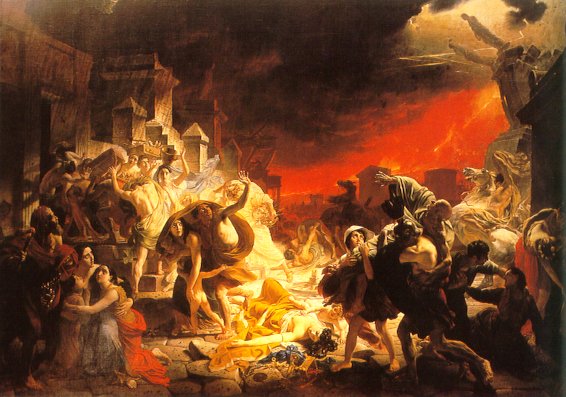 |
||
|
|
|
|
| "The Last Day of Pompeii" |
|
|
|
|
|
|
 |
||
|
|
|
|
| "The Last Day of Pompeii" |
|
| For some web resources tied to Wheelock's Latin, click here. |
| Instructor: Dr. Annette Giesecke
445 Smith Hall, x0545 alg@udel.edu Classes: MWF 9:05, Old College 202
Texts: Frederick M. Wheelock, Wheelock’s
Latin. Harper Collins
Anne Groton and James May, 38 Latin Stories. Bolchazy-Carducci
*Norman Goldman and Ladislas Szymanski,
English Grammar
Aims: The aim of this course is to introduce students to the language and culture of ancient Rome via her extant literature. In the course of the first year of Latin, students will achieve a degree of linguistic competence necessary to read, understand, appreciate, and form a “personal” response to such classic works as Virgil’s Aeneid, the political speeches of Cicero, the poetry of Catullus, and the histories of Livy and Tacitus. A further aim of this course is to make students aware of the significant debt of the English language to Latin. Expectations: It is of great importance that students
attend class regularly because it is easy to fall behind in a beginning
language course. It is also very important that students participate as
this is a course that is interactive in nature. Regular attendance constitutes
class participation. Unexcused absences will lower a student’s final grade.
Three absences will be permitted without excuse (with the exception of
days on which there are quizzes or tests). In order to avoid penalty, students
must submit documentation from the office of the Dean or from a physician
no later than 7 days after the absence in question.
Assignments: There will be regular written homework assignments, which will be collected at the end of class. Practice is the key to success, so it is important to complete the assignments as they are given. Grading: The final course grade will be calculated as follows: Weekly quizzes: 10%
SCHEDULE OF CLASSES: August 31: Introduction: alphabet and pronunciation; Intro to Ch. 1
Sept. 2: go over Ch. 1. Introduction to Ch. 2 (nouns, cases, 1st declension
nouns and adjectives)
5: Holiday 7: Review and drill nouns, cases, adjectives, and vocab.
9: Quiz on nouns and verbs; Intro to Ch. 3 (2nd declension; masculine
nouns and adjectives; apposition; word order)
12: Go over Ch. 3 exercises
14: Go over readings; present Ch. 4 (2nd declension neuters; adjectives;
sum; predicate nouns and adjectives; adjectives as nouns)
16: Go over ex. Ch. 4; present Ch. 5 (1st and 2nd conjugations; future
and imperfect)
19: Quiz on 1st and 2nd declension nouns and adjectives; present
rest of grammar Ch. 5 (adjectives
21: Translation and discussion of Ch. 5
23: Go over readings; present Ch. 6 (future and imperfect of sum; possum;
complementary infinitives)
26: Quiz on verbs; go over ex. Ch. 6
28: go over reading; review for test
30: Test 1 Oct. 3: go over test; Intro. to Ch. 7 (3rd Declension Nouns)
5: go over exercises; Intro to Ch. 8 (3rd conjugation; present infinitive;
present, future and imperfect indicative; imperative)
7: Quiz on 3rd Decl. Nouns; go over ex.
10: go over reading; present Ch. 9 (demonstratives; special –ius
adjectives)
12: go over exercises; present Ch. 10 (4th conjugation and –io verbs
of the 3rd)
14: Quiz on demonstratives; go over exercises; present personal pronouns
(Ch. 11, part I)
17: go over reading; present rest of Ch. 11 (3rd person pronoun, etc)
19: go over exercises: present Ch. 12 (perfect active system)
21: drill perfect; go over ex; read “Cicero denounces Catiline” p. 73
24: go over readings; present Ch. 13 (relative pronouns and possessives;
intensive pronoun)
26: Quiz on perfect; go over exercises; present Ch. 14 (I-stem nouns
of 3rd declension; ablative of
28: FALL BREAK 31: go over exercises; review for test
Nov. 2: Test 4: go over test; read “Echo and Narcissus” LS 22
7: go over reading; present Ch. 15 (numerals, genitive of the whole;
genitive and ablative with cardinal numerals; ablative of time)
9: go over exercises; present Ch. 16 (3rd declension adjectives)
11: go over reading; Minotaur and Roman Villa
14: go over exercises; present Ch. 17 (relative pronouns)
16: go over exercises; passive voice (Ch. 18, part I)
18: Quiz on relative pronouns; go over reading; practice passive; present
rest of Ch. 18 (ablative of agent)
21: go over exercises; present perfect passive (Ch. 19, part I)
23: 28: go over reading; present rest of Ch. 19 (interrogative pronouns
and adjectives)
30: Quiz on passive; go over exercises; present fourth declension (Ch.
20, part I)
Dec. 2 go over reading; present rest of Ch. 20 (ablatives of place from
which and separation)
5: go over exercises; reading practice
7: Review for final exam
|
||||||||||||||||||||||||||||||||||||||||||||||||||||||||||||||||||||||||||||||||||||||||||||||||||
|
||||||||||||||||||||||||||||||||||||||||||||||||||||||||||||||||||||||||||||||||||||||||||||||||||
| SOME WEB RESOURCES TIED TO WHEELOCK'S LATIN (5th ed., but still useful): | ||||||||||||||||||||||||||||||||||||||||||||||||||||||||||||||||||||||||||||||||||||||||||||||||||
|
||||||||||||||||||||||||||||||||||||||||||||||||||||||||||||||||||||||||||||||||||||||||||||||||||
|
||||||||||||||||||||||||||||||||||||||||||||||||||||||||||||||||||||||||||||||||||||||||||||||||||
|
||||||||||||||||||||||||||||||||||||||||||||||||||||||||||||||||||||||||||||||||||||||||||||||||||
|
||||||||||||||||||||||||||||||||||||||||||||||||||||||||||||||||||||||||||||||||||||||||||||||||||
|
||||||||||||||||||||||||||||||||||||||||||||||||||||||||||||||||||||||||||||||||||||||||||||||||||
| THIS PAGE WILL BE UPDATED WEEKLY -- PLEASE CHECK BACK. | ||||||||||||||||||||||||||||||||||||||||||||||||||||||||||||||||||||||||||||||||||||||||||||||||||
Foreign Languages and Literatures Home Page
Department of Foreign Languages and Literatures
325 Smith Hall, University of Delaware, Newark
DE 19716
(302) 831-6882